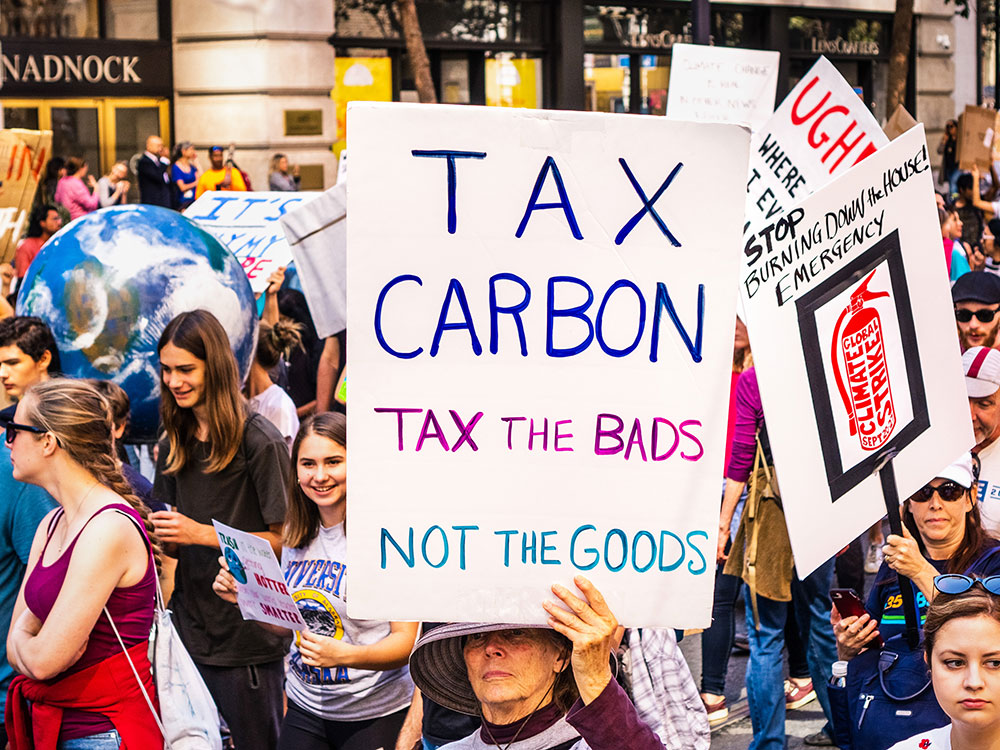British Columbia’s carbon tax has grabbed headlines and made a difference. But other, lower profile policies have been even more effective at reducing greenhouse gas emissions without the controversy or political risk.
That’s the central conclusion of a recent paper co-authored by Katya Rhodes, an assistant professor in the University of Victoria’s school of public administration and an economist focused on climate policy.
“The main message is that climate action can be very difficult, depending on your constituency,” said Rhodes, “but climate-sincere governments... can actually reduce emissions and set the stage for other jurisdictions.”
In “Climate Policy in British Columbia: An Unexpected Journey” published in Frontiers in Climate, Rhodes and Malcolm Fairbrother, a British Columbian who teaches sociology in Sweden, argue that B.C.’s carbon tax has survived thanks to “some simple good fortune” through successive governments.
“The enactment of its carbon tax has made the case of B.C. intriguing,” they wrote, noting the policy was introduced despite the province being a fossil fuel producer, Canada being a “poor climate performer” overall and the fact that “carbon taxes are politically challenging to introduce anywhere.”
Features of B.C.’s carbon tax design and promotion are worth replicating in other jurisdictions.
But they cautioned “the case of B.C. should not be reduced to its tax, as the province has enacted other notable climate policies, some of which have done more to reduce emissions while attracting less public criticism.”
The authors based the paper on news articles, government reports and academic publications, plus interviews with six individuals who were involved in making climate policy in the province. They don’t identify the individuals, but say they included bureaucrats, politicians, someone from an environmental think tank, a representative of a business association and an academic.
The paper traces history familiar to British Columbians, starting with premier Gordon Campbell’s BC Liberal government’s surprise announcement of the tax in 2008, the Opposition NDP’s campaign against it in the 2009 election, its freezing under former BC Liberal premier Christy Clark and the strengthening of climate policy after the NDP formed government in 2017 with BC Green Party support.
Through it all B.C. has been closely watched by the federal government and other jurisdictions considering how to address climate change, said Rhodes, who from 2016 to 2019 provided economic analysis and advice to the provincial government’s Climate Action Secretariat.
“We should be proud that British Columbia, at least in the North American context, is one of those rare jurisdictions that was a pioneer and a lead in implementing effective climate policy that is set to achieve substantial emission reductions,” she said.
The province may have missed its 2020 targets, largely because the carbon tax was set too low, Rhodes said, but it appears to be on the right track now and is building on the good foundation set starting in 2008.
A key policy has been the Clean Electricity Standard, which in 2010 killed plans BC Hydro had to build two plants that would have burned natural gas and one that would have burned coal to generate electricity.
The decision “immediately reduced emissions way more than the carbon tax reduced emissions by 2020,” Rhodes said.
Another major move, she said, was the introduction of the Low Carbon Fuel Standard which requires reductions in the average carbon content of gasoline and diesel and has resulted in more zero-emission biofuels being added to fuels each year.
It has been responsible for significant reductions in carbon emissions, especially as standards have been made more stringent since 2017. With minimal public discussion or controversy, she added, those emission reductions have been greater than those achieved through the carbon tax.
The carbon tax does have its advantages, Rhodes said. Compared to regulations, it is more efficient and allows people and companies the freedom to make their own choices about how to reduce emissions. The carbon tax also allowed the province to lower other taxes, she said, and thus help the economy grow.
Ultimately success will require a mix of regulations, subsidies and educational programs, said Rhodes.
“I think we need everything because of the multifaceted nature of political acceptance,” she said. It’s politically safer to have a mix of policies, particularly in North America where there is more resistance to using taxation as a tool to reach climate targets.
If it becomes politically hard to maintain a carbon tax, as it is in much of the U.S., Rhodes said, “there is no need to focus on it at all.”
“The emissions can be reduced just through regulations if taxation becomes too difficult.”
In 2021 the B.C. government released a Roadmap to 2030 that built on the earlier CleanBC plan to show how it would meet the legislated goal of a 40-per-cent drop below 2007 levels by 2030.
Critics argued the plan would fail as long as the province continued to encourage the oil and gas sector to grow, though government officials have said any new development would have to fit within the climate plan.
B.C.’s climate change accountability law requires deeper cuts by 2040 and 2050. The government missed a previous goal of a 33-per-cent reduction by 2020, with emissions instead remaining more or less unchanged from 2007 levels.
Rhodes said the targets matter less than the policies. “I’m not worried too much about targets as long as there are compulsory climate policies that increase in stringency with accountability mechanisms,” she said. “I do think the current government is quite climate-sincere.”
One thing the province has done is provide a platform so that it can be held accountable, she said, pointing to the creation of the climate advisory council with representatives from different sectors and academia who provide an independent assessment each year of the government’s efforts to reduce carbon emissions.
In its most recent report, released in October 2022, the council expressed particular concern about proposed liquefied natural gas terminals that would produce emissions the government hasn’t included in its projections, the transportation sector which has “emissions trending rapidly in the wrong direction” and the challenges in retrofitting existing buildings.
“This group has power to go to media, to ruin government’s reputation if needed,” Rhodes said. “The government has been quite responsive to the advice.”
The province’s minister responsible for environment and climate change strategy, George Heyman, said he hadn’t read the paper but that he agrees with the point that a mix of approaches is needed.
“The carbon tax has been demonstrated to be the most cost-effective way to influence emission reductions, but it’s also true you need a number of tools — and the carbon tax is a very important one,” Heyman said.
It’s important to create incentives for both industry and the public and communicate them well so that they see the advantages of investing in emission reductions, he said, adding that cutting carbon emissions has productivity and affordability benefits.
The government is continuing to work on implementing the CleanBC plan, which it is always reviewing with advice from the Climate Solutions Council and others, he said.
Since David Eby became premier the government has established a new ministry for climate readiness and emergency preparedness, and Heyman said more announcements related to climate and carbon emissions are coming in the next few weeks. ![]()
Read more: Energy, BC Politics, Environment
















Tyee Commenting Guidelines
Comments that violate guidelines risk being deleted, and violations may result in a temporary or permanent user ban. Maintain the spirit of good conversation to stay in the discussion.
*Please note The Tyee is not a forum for spreading misinformation about COVID-19, denying its existence or minimizing its risk to public health.
Do:
Do not: